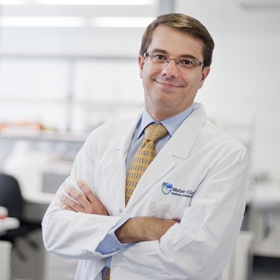
Professor Andrew Roberts. Source: WEHI
In 2018 oncologists can expect to see new therapies for blood cancers, more attention on so-called ‘rare cancers’ and more work on how to apply new technologies.
According to Professor Andrew Roberts, head of the Walter and Eliza Hall Institute’s Clinical Translation Centre, the challenge is to distinguish between excitement about potential and the evidence that will really change practice in the very short term.
He tells the limbic there is ‘an enormous amount happening’ as new drugs approved in the US for myeloma, leukaemia and lymphoma in recent years start to become available in Australia.
“They will be working their way through the system,” he says.
“The other thing is that for some of these diseases, there is a fair bit of work going on in terms of patient registries – to try and better understand what is happening in the real world and how that relates to what happens in trials so that we can better translate the information from trials into how people are looked after in the Australian context.”
“And at the same time there is a lot of work going on how to apply new technology particularly around genomics and how to best use that for patients within standard practice and in clinical trials.”
Professor Roberts says there will be more attention on rare cancers in 2018.
“And increasingly we will be considering the small sub-groups of common cancers just as we consider the rare cancers. My feeling is that the focus on rare cancers is helpful in trying to attract additional resources and trials and attention but that it is overly simplistic,” he said.
For example, he says evidence from recent studies – here and here – demonstrates the genetic diversity of AML.
“This is why I think it’s great to see the emphasis going on registries so we can now collect information about people with so-called rare cancers and we can subgroup people with more common cancers such as AML, into the smaller groups that we need to go ahead with trials.”
Trials will change
However Professor Roberts says that unfortunately clinical trials are getting harder, not easier to do.
“The design of the trials gets quite complex particularly if you want to do a trial with a targeted therapy. And because you want to subdivide common diseases into subgroups that are defined by genomic abnormalities, now the numbers of patients are low.”
He says collaboration and participation in international trials is increasingly important.
Using genomic analysis, Professor Roberts says he would like to see better differentiation of patients with myeloma that have a particularly poor prognosis and need new treatment options.
One of the challenges is to work out which combinations of drugs have potential and to how to test them both in the lab and in clinical trials.
He adds that there is also excitement in haematology about how to get the body’s immune system to work better against cancers via either CAR T-cell or bi-specific T-cell engager (BiTE) therapies.
At the same time, we were going to learn in the next year or so where PD-1 and PDL-1 inhibitors, which have proved highly effective in some patients with melanoma and some other solid cancers, might have a role in haematological malignancies.